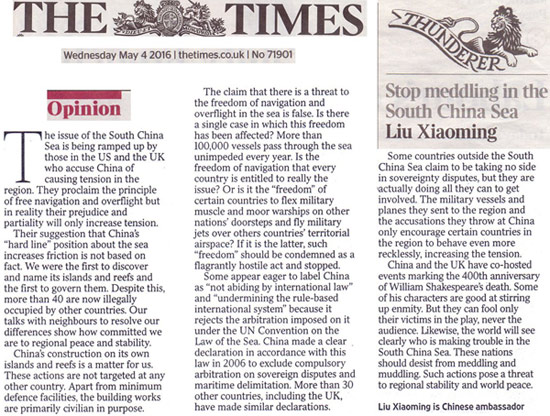【中英文對照】中國駐英大使劉曉明在《泰晤士報》發(fā)表署名文章《停止插手南海事務(wù)》(全文)
發(fā)布時(shí)間:2016-05-06 15:57:00 | 來(lái)源:中國網(wǎng) | 作者: | 責任編輯:李瀟
|
| 5月4日,《泰晤士報》刊登了劉曉明大使題為《停止插手南海事務(wù)》的署名文章。 The Times published?a signed article by Ambassador Liu Xiaoming entitled "Stop meddling in the South China Sea" on May 4, 2016. |
| 2016年5月4日,英國主流大報《泰晤士報》紙質(zhì)版和網(wǎng)絡(luò )版分別刊登劉曉明大使題為《停止插手南海事務(wù)》的署名文章,全文如下: | On 4 May, the Times and its website published a signed article by Ambassador Liu Xiaoming entitled "Stop meddling in the South China Sea". The full text is as follows: |
| 最近,南海問(wèn)題又被炒得沸沸揚揚。美國、英國都有人在南海問(wèn)題上高調發(fā)聲,指責中國造成了南海局勢的緊張,鼓吹所謂“捍衛航行和飛越自由”。但實(shí)際上,他們這些充滿(mǎn)偏見(jiàn)和偏袒的言論恰恰加劇了南海地區的緊張形勢。 | The issue of the South China Sea is being ramped up by those in the US and the UK who accuse China of causing tension in the region. They proclaim the principle of free navigation and overflight but in reality their prejudice and partiality will only increase tension. |
| 首先,這些人指責中國的所謂“強硬行動(dòng)”造成了南海局勢的緊張。這種看法罔顧事實(shí)。中國人最早發(fā)現了南海諸島,最早為其命名,最早實(shí)施行政管轄。然而,迄今為止南海有40多個(gè)島礁被個(gè)別國家非法侵占。對此,中國始終堅持通過(guò)雙邊談判協(xié)商解決爭議,致力于共同維護南海地區的長(cháng)期和平穩定。中國在南海的島礁建設,完全是中國主權范圍內的事,不針對任何國家,除滿(mǎn)足必要的軍事防衛需求外,更多的是為各類(lèi)民事需求服務(wù)。 | Their suggestion that China's "hard line" position about the sea increases friction is not based on fact. We were the first to discover and name its islands and reefs and the first to govern them. Despite this, more than 40 are now illegally occupied by other countries. Our talks with neighbours to resolve our differences shows how committed we are to regional peace and stability. China's construction on its own islands and reefs is a matter for us. These actions are not targeted at any other country. Apart from minimum defence facilities, the building works are primarily civilian in purpose. |
| 第二,這些人鼓吹的所謂“捍衛航行和飛越自由”實(shí)際上是偽命題。請問(wèn)南海航行和飛越自由受影響了嗎?事實(shí)上,每年世界各國十萬(wàn)多艘船只在南海地區暢通無(wú)阻,從未發(fā)生問(wèn)題。我不清楚這些人所稱(chēng)的“航行和飛越自由”到底是什么?是各國依據國際法享有的航行自由?還是個(gè)別國家耀武揚威,可以為所欲為地將軍艦開(kāi)到別人家門(mén)口,將軍機飛越別國領(lǐng)空的自由?如果是后者,我想這樣的自由實(shí)質(zhì)上是一種公然的挑釁和敵對行為,應當受到譴責和禁止。 | The claim that there is a threat to the freedom of navigation and overflight in the sea is false. Is there a single case in which this freedom has been affected? More than 100,000 vessels pass through the sea unimpeded every year. Is the freedom of navigation that every country is entitled to really the issue? Or is it the "freedom" of certain countries to flex military muscle and moor warships on other nations' doorsteps and fly military jets over others countries' territorial airspace? If it is the latter, such "freedom" should be condemned as a flagrantly hostile act and stopped. |
| 第三,這些人說(shuō)中國必須接受菲律賓單方面提起的南海仲裁,否則就要給中國扣上“不遵守國際法”和“破壞基于規則的國際體系”的大帽子。這完全是顛倒黑白。中國不參與、不接受仲裁,是由于中國早在2006年就根據《聯(lián)合國海洋法公約》相關(guān)規定作出了排除性聲明,將主權爭議和海洋劃界等問(wèn)題排除在強制性爭端解決機制之外。要特別指出的是,包括英國在內的30多個(gè)國家都做出了類(lèi)似聲明。 | Some appear eager to label China as "not abiding by international law" and "undermining the rule-based international system" because it rejects the arbitration imposed on it under the UN Convention on the Law of the Sea. China made a clear declaration in accordance with this law in 2006 to exclude compulsory arbitration on sovereign disputes and maritime delimitation. More than 30 other countries, including the UK, have made similar declarations. |
| 一些域外國家聲稱(chēng)對南海主權爭議不選邊站隊,但同時(shí)又竭力介入南海問(wèn)題。他們一方面出動(dòng)飛機軍艦,另一方面對中國妄加指責。這只能助長(cháng)區域內少數國家的肆意妄為,使局勢進(jìn)一步緊張。 | Some countries outside the South China Sea claim to be taking no side in sovereignty disputes, but they are actually doing all they can to get involved. The military vessels and planes they sent to the region and the accusations they throw at China only encourage certain countries in the region to behave even more recklessly, increasing the tension. |
| 今年是莎士比亞逝世400周年。中英兩國將舉辦一系列紀念活動(dòng)。莎翁筆下的一些角色慣于搬弄是非、無(wú)事生非,盡管劇中人難免受騙上當,但讀者和觀(guān)眾總能洞若觀(guān)火,明辨是非。今天,誰(shuí)在南海問(wèn)題上攪渾水,世人也是看得一清二楚。我奉勸那些域外國家,不要再攪渾水,他們的行為已對地區穩定與世界和平構成了直接的威脅。 | China and the UK have co-hosted events marking the 400th anniversary of William Shakespeare's death. Some of his characters are good at stirring up enmity. But they can fool only their victims in the play, never the audience. Likewise, the world will see clearly who is making trouble in the South China Sea. These nations should desist from meddling and muddling. Such actions pose a threat to regional stability and world peace. |


